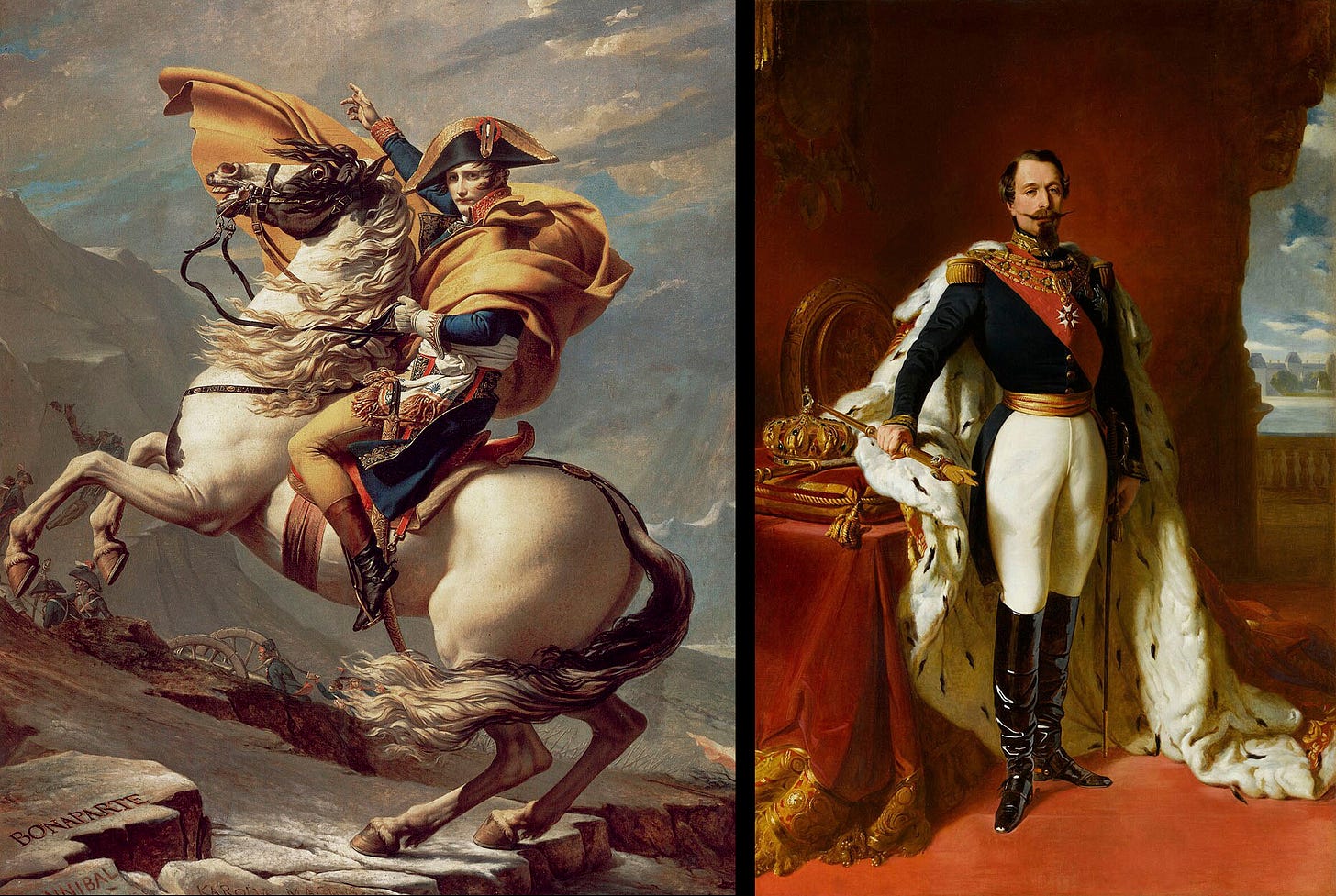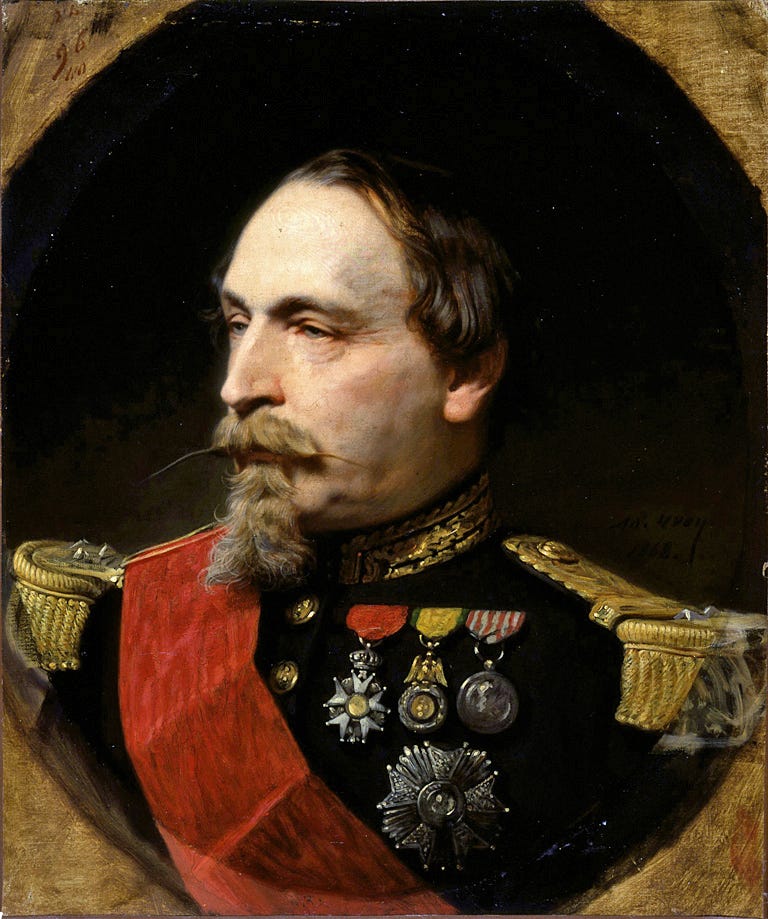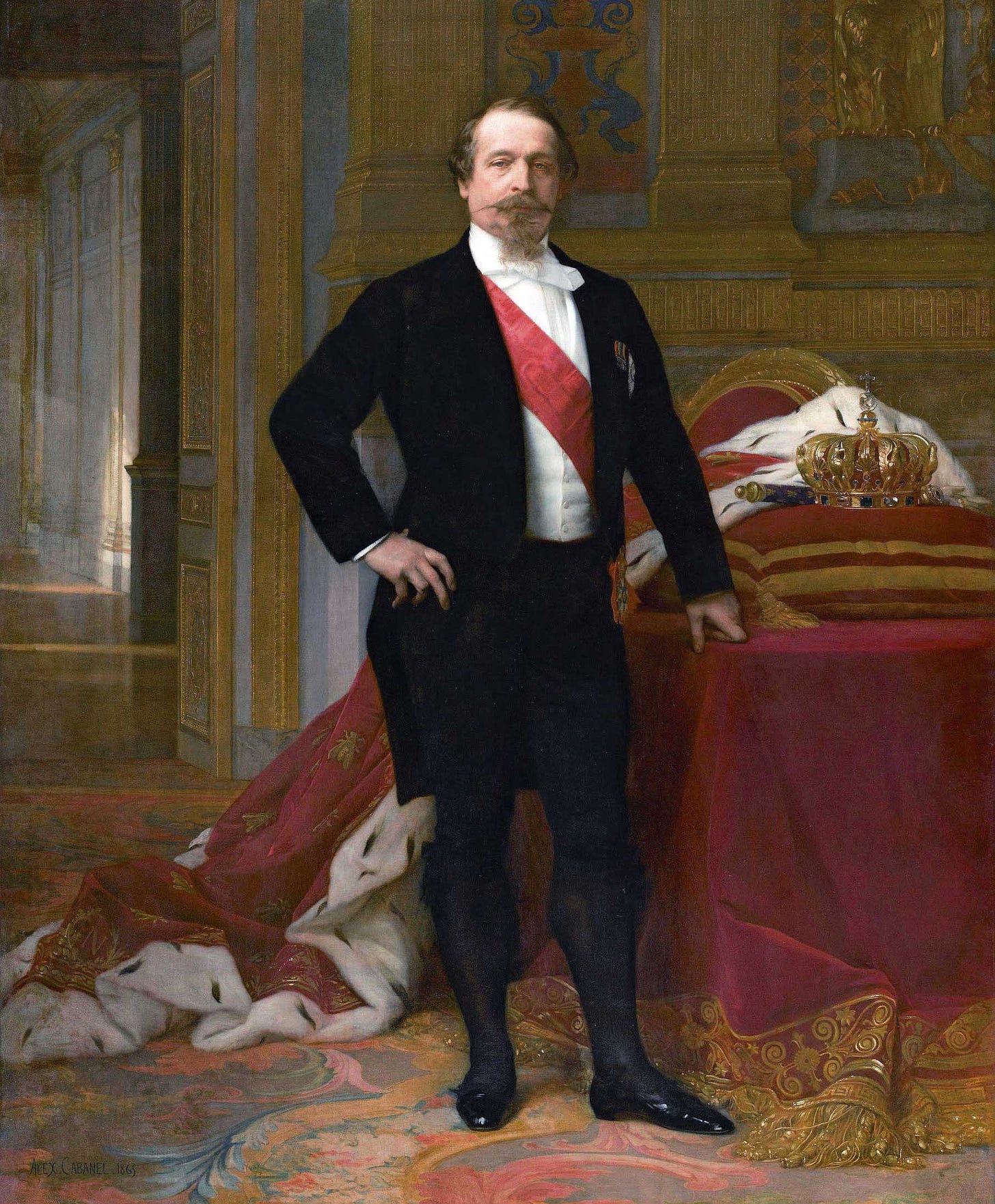Can You Lose with Honor?
Lessons from the Emperor who faced defeat with dignity...
Responding to loss is among the hardest trials of any leader. Responding to loss when your entire organisation expected victory, however, is perhaps the only thing worse.
It is this precisely this terrible situation that Napoleon III, Emperor of the French, faced on the 2nd September 1870. For on the battlefields of Sedan, the Emperor was forced to confront both his own failures and those of others all at once, when he realised that victory over Prussia was militarily impossible.
His dramatic surrender to Otto von Bismarck, and the fall of the Second French Empire soon after, was a watershed moment in history, paving the way for the rise of Germany, the humbling of France, and the end of the balance of power in Europe. More than a few roads to the outbreak of the First World War were indeed paved at Sedan.
Eager as Man is to find an easy scapegoat, Napoleon has long shouldered much of the blame for the disaster. After all, he was the Emperor, so he should, shouldn’t he?
Yet while Sedan was at least partially the fruit of the Emperor’s own shortcomings, his decision to surrender — an act many would otherwise consider to be the height of dishonour — was ironically among his finest hours.
Here is what the example of Napoleon III can teach you about learning from your mistakes, and achieving redemption…
The Contradictions of Napoleon

Stepping into a role formerly occupied by a man who was widely admired is never an admirable prospect. When your uncle was Napoleon Bonaparte himself however, and you are seen as his heir in name and legacy by all those who feel nostalgia for him, the tyranny of expectation is almost unbearable.
So when, thirty seven years after Waterloo, a Bonaparte was once more upon the imperial throne of France, it was inevitable that many would compare him to his predecessor, and judge him by such standards. The new Emperor Napoleon III, however, was of course not his uncle. Nor, in sincerity, did he claim to be. On the contrary, before his reign had even begun he had non-too subtly signalled a desire to chart a course different from his bellicose forebear:
“Some people say the Empire is war. I say the Empire is peace”
Napoleon III, 9th October 1852
Yet the Second French Empire would indeed be defined, and ultimately undone, by its contradictions. The Emperor could never decide whether he was a revolutionary or a conservative, and his fear of losing his people’s affection would ensure that he was easily led astray by bad actors. A prime example of this was his conflicted relationship with the Catholic Church.
As the head of a Catholic nation, Napoleon wished to present himself as the defender of Rome, yet his personal relationships with Italian nationalists, and the support for Italian Unification which resulted, directly threatened the Papacy. In vacillating between the two, he would please neither, and alienate both.
Nevertheless, when Napoleon III followed his better instincts he achieved great popularity among many of his people, particularly those in rural France and in metropolitan Paris, which he would famously rebuild into the romantic City of Light that would define the European Belle Epoque. He would foster that popularity by his trademark political manoeuvre — circumventing the legislative process by going directly to the people, legitimising his policies by nationwide plebiscite rather than parliamentary vote.
As a result, however, he was loathed by the intelligentsia of Paris, who resented the Emperor’s subversion of republican sensibilities. Their criticisms, spearheaded by the attacks of Victor Hugo, would sting Napoleon, leaving him fearful of his own autocracy. It was this that induced his single biggest mistake — granting his opponents needlessly sweeping concessions from a position of strength. In addition to lifting restrictions on the media, he steadily ceded his own power to the Corps Législatif — the French Parliament — with the result that by the decade’s end Napoleon III was little more than constitutional monarch, who was barely involved in the direction of government.
It was a move that would backfire spectacularly, leaving Napoleon as an all but powerless figurehead to a government whose convictions were at odds with his own. The folly of it all would become only too apparent when the Emperor of peace found himself forced to lead France into war…
The Shadow Emperor
The crisis would come to a head in 1870 when, after a revolution in Madrid, the Crown of Spain was offered to Prince Leopold of Hohenzollern, a relative of the King of Prussia. Paris, already suspicious of Prussian power, feared that France would now be encircled by enemies.
It was a matter that could easily have been resolved by diplomacy, as evidenced by the Prussian government indeed withdrawing the candidacy when pressured. Unfortunately, the French government and ministries reacted with such needlessly aggressive and condescending public statements that France was unnecessarily thrust into a doom spiral to war.
A seriously ill Napoleon meanwhile, who could physically or legally do little more than listen and advise, was aghast at how recklessly almost the entire French establishment was racing to war:
“In almost incessant pain, he had to listen to the discussions of a divided ministry; to generals who assured him that the army was in splendid condition, that the Prussians were a fortnight behindhand, and that victory was certain; to the Court party, who were opposed to the parliamentarians; to the clericals who detested the confederation of the north; and to the sincere, if misguided, friends of his dynasty, who, believing in the reports of Marshal Leboeuf and his comrades, saw the Emperor returning after a short triumphant campaign, along the via sacra of his capital, at the head of his victorious legions”
Jerrold, B, The Life of Napoleon III, Vol. IV, 1882
On top of it all was public pressure, whipped up by the now unfettered French press, which by the summer had resulted in mass demonstrations on the streets of Paris clamouring for war with Prussia.
Napoleon for his part was deeply sceptical of his government’s claims, particularly their brash assertion that any war would be brief. His suspicions would be proved correct, but it mattered little. Increasingly sidelined by forces he had unwittingly strengthened, he was forced to yield. Thus on the 19th July, 1870, by an unassailable majority of 236 the Corps Législatif voted for war, and the doom of France.
The Emperor now faced an appalling prospect, but was not entirely blameless. Parliament was responsible for the outbreak of war, but it was Napoleon who was responsible for giving them that power in the first place. As Emperor, however, he was now the public face of a national crisis that others had largely caused. So what was Napoleon, a monarch constitutional by law but absolute in responsibility, to do?
The Emperor’s answer to this impossible question has much to teach us about learning from our mistakes, and earning redemption even in a hopeless situation…




